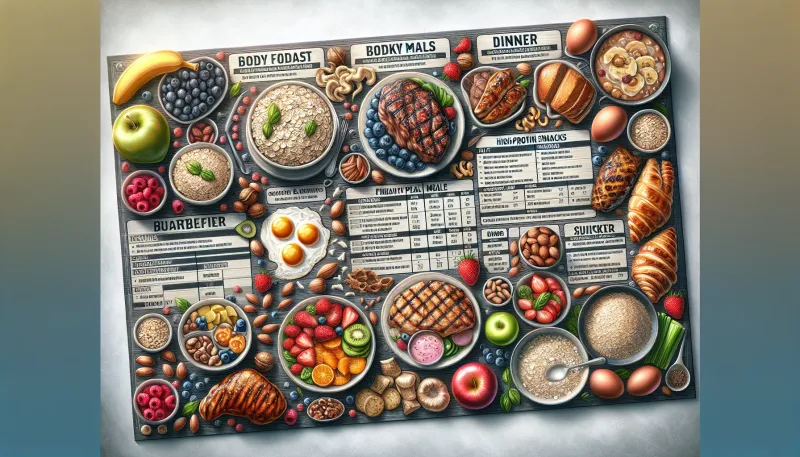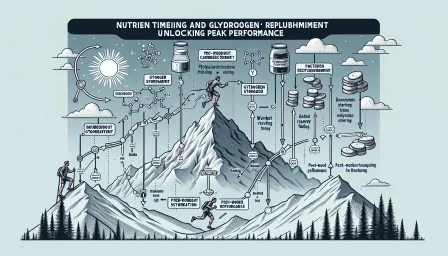Ultimate Bodybuilding Diet Plan for Bulking: Gain Mass Fast!

Learn the ultimate bodybuilding diet plan for bulking to gain mass fast with our comprehensive guide.
Are you looking to pack on muscle mass swiftly and effectively? Crafting the perfect bodybuilding diet plan for bulking is crucial for achieving your goals. This detailed guide will walk you through everything you need to know about bulking diets, from the fundamental principles to specific meal plans.
Understanding Bulking in Bodybuilding
Bulking in bodybuilding involves consuming a calorie surplus to support muscle growth. This process requires a strategic approach to ensure you gain muscle without accumulating excessive fat. The primary goals are to increase muscle mass and strength while maintaining a healthy body composition.
Why Calories Matter
Calories are the cornerstone of any bulking phase. To promote muscle growth, you must consume more calories than you burn. This is known as a caloric surplus. However, it's important to find the right balance to avoid unnecessary fat gain.
The Macronutrients Breakdown
In a bodybuilding diet plan for bulking, the three macronutrients - proteins, carbohydrates, and fats - play distinct roles:
- Proteins: Essential for muscle repair and growth; aim for 1.2-2.2 grams per kilogram of body weight.
- Carbohydrates: Provide energy for training sessions and support muscle recovery; they should make up around 45-65% of your total caloric intake.
- Fats: Crucial for hormone production and overall health; aim for 20-35% of your total caloric intake from healthy fats.
Creating Your Bodybuilding Diet Plan for Bulking
Step 1: Determine Your Caloric Needs
Start by calculating your Total Daily Energy Expenditure (TDEE) using an online calculator or a formula like the Harris-Benedict equation. Once you know your TDEE, add about 10-20% to establish your caloric surplus.
Step 2: Distribute Your Macronutrients
Distribute your caloric intake among the macronutrients as follows:
- Proteins: 1.2-2.2 grams per kilogram of body weight.
- Carbohydrates: 45-65% of your total caloric intake.
- Fats: 20-35% of your total caloric intake.
Step 3: Plan Your Meals
Creating a meal plan helps ensure you meet your nutritional needs. Here's an example of a daily meal plan for a 70kg individual:
Sample Meal Plan
- Breakfast: Oatmeal with berries, a banana, and a protein shake (Approx. 600 calories).
- Mid-Morning Snack: Greek yogurt with honey and nuts (Approx. 300 calories).
- Lunch: Grilled chicken breast, quinoa, and a mixed vegetable salad with olive oil (Approx. 700 calories).
- Afternoon Snack: Protein bar and an apple (Approx. 350 calories).
- Dinner: Baked salmon, sweet potatoes, and steamed broccoli (Approx. 800 calories).
- Evening Snack: Cottage cheese with pineapple (Approx. 250 calories).
Common Mistakes to Avoid
When following a bodybuilding diet plan for bulking, be wary of these common mistakes:
Overestimating Caloric Surplus
Aiming for too high a caloric surplus can result in excessive fat gain. Stick to a moderate surplus of 10-20% above your maintenance calories.
Neglecting Nutrient Timing
Consuming protein and carbohydrates around your workouts can enhance muscle protein synthesis and recovery. Try to eat a balanced meal 2-3 hours before training and a post-workout meal shortly after.
Ignoring Micronutrients
Focusing solely on macronutrients means you might miss essential vitamins and minerals. Incorporate a variety of fruits, vegetables, nuts, and seeds to cover your micronutrient needs.
Supplements for Bulking
While whole foods should be your primary nutrient source, certain supplements can support your bulking efforts:
- Whey Protein: Convenient and effective for meeting protein needs.
- Creatine: Enhances strength and power output, aiding muscle growth.
- BCAAs: Reduce muscle soreness and support recovery.
- Multivitamins: Ensure you get sufficient vitamins and minerals.
Monitoring Your Progress
Tracking your progress helps you make necessary adjustments to your diet and training. Monitor these key indicators:
- Body Weight: Weigh yourself weekly to ensure you're gaining at a steady rate (0.25-0.5 kg per week).
- Body Composition: Use methods such as skinfold calipers or bioelectrical impedance analysis to estimate your body fat percentage.
- Strength Gains: Track your lifts to ensure you're getting stronger as you bulk.
Conclusion
Formulating an effective bodybuilding diet plan for bulking requires a balance of science, precision, and consistency. By understanding your caloric needs, distributing macronutrients appropriately, planning your meals, and avoiding common mistakes, you can optimize your bulking phase. Supplements can provide a helpful boost, but whole foods should remain your foundation. Regularly monitor your progress to make data-driven adjustments and ensure you're on track to achieve your muscle-building goals.
Remember, the key to a successful bulk lies in consistency and patience. Stick to your plan, make adjustments as needed, and stay dedicated to your training regimen. Before long, you'll see the gains you've been working hard for!



























